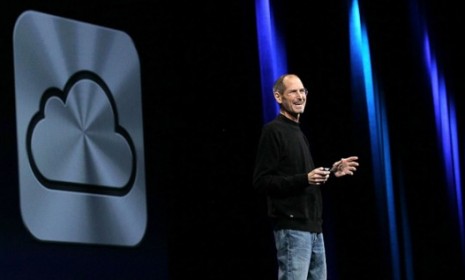Apple's big iCloud announcement: 3 takeaways
Apple CEO Steve Jobs rolls out a new cloud-based service that lets users store and sync their music, photos, and other documents. Is it a game-changer?

A free daily email with the biggest news stories of the day – and the best features from TheWeek.com
You are now subscribed
Your newsletter sign-up was successful
Apple has added a new "i" to its product lineup. On Monday, Steve Jobs briefly interrupted his medical leave of absence to introduce the company's much anticipated iCloud service. The (mostly) free internet-based service, to be released in full this fall, will let users store their music (and other files) online, and automatically and wirelessly sync their various electronic devices. Here, three things you need to know about Apple's iCloud:
1. The cloud will kill your hard drive
Computers are no longer at the hub of users' digital lives now that cell phones, tablets, and other devices all hold music, photos, videos, and other digital files. "Keeping these devices in sync is driving us crazy," Jobs said. So our digital lives are now "going to be in the 'cloud,'" says Yukari Iwatani Kane of The Wall Street Journal, meaning that files will be stored online, so you can access them anywhere, from any device. "The world we’re headed to is where you don’t have to think about which gadget has your stuff," says Forrester Research analyst Frank Gillett, as quoted by Bloomberg News. All users will get 5 GB of free storage on Apple's servers for mail and other documents, but nearly unlimited free storage for music and books.
The Week
Escape your echo chamber. Get the facts behind the news, plus analysis from multiple perspectives.

Sign up for The Week's Free Newsletters
From our morning news briefing to a weekly Good News Newsletter, get the best of The Week delivered directly to your inbox.
From our morning news briefing to a weekly Good News Newsletter, get the best of The Week delivered directly to your inbox.
2. Apple is flexing its music industry muscle
Only music bought from iTunes can be transferred to the iCloud for free, say Declan McCullagh and Greg Sandoval at CNET, and that "may limit iCloud's allure for music aficionados who have transferred gigabytes of music from legally purchased CDs to their computers." Apple's trying to address that with iTunes Match. For a yearly fee of $24.99, the service will scan your iTunes library, including songs ripped from CDs, and match what it finds against the 18 million songs available through iTunes. "The chances are good we have the songs you've ripped," said Jobs, as quoted by TechCrunch. "That means customers don’t have to upload all their music song by song," as other cloud services require, say Adam Satariano and Peter Burrows at Bloomberg News.
3. iCloud isn't just about music
"This is such a serious rethink of how Apple devices work with content that Apple is killing its MobileMe service," says Kit Eaton at Fast Company. MobileMe's Calendar, Mail, and Contacts applications have all been rewritten to work with iCloud, so if you update an entry on your iPhone, it will automatically sync across your other devices. Apps, electronic books, and photos will also be synced across devices. That means that "if you are reading an iBook on your iPad, it will remember any page you bookmark so you can pick it up on your iPhone," says Erick Schonfeld at TechCrunch.
A free daily email with the biggest news stories of the day – and the best features from TheWeek.com
-
 Political cartoons for February 3
Political cartoons for February 3Cartoons Tuesday’s political cartoons include empty seats, the worst of the worst of bunnies, and more
-
 Trump’s Kennedy Center closure plan draws ire
Trump’s Kennedy Center closure plan draws ireSpeed Read Trump said he will close the center for two years for ‘renovations’
-
 Trump's ‘weaponization czar’ demoted at DOJ
Trump's ‘weaponization czar’ demoted at DOJSpeed Read Ed Martin lost his title as assistant attorney general